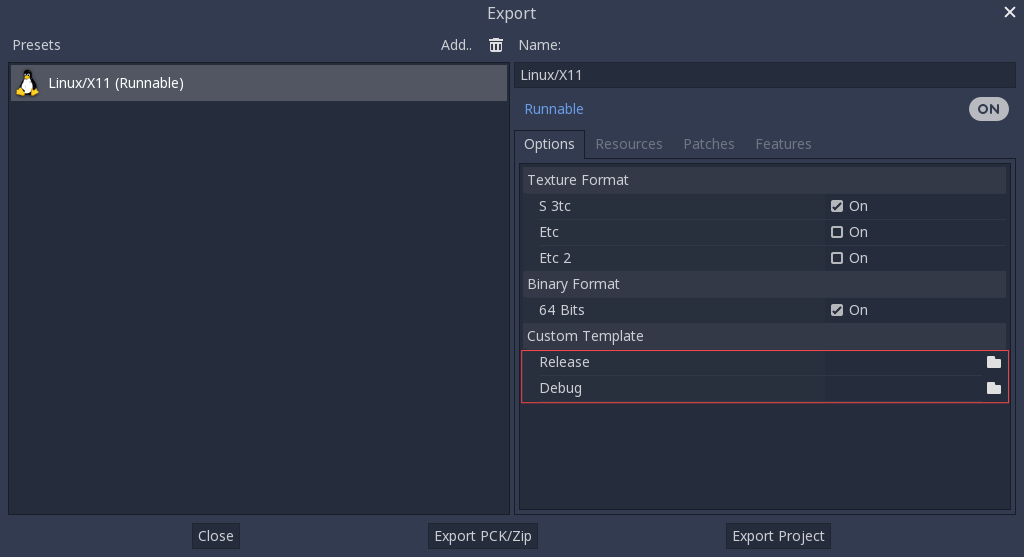Compiling for X11 (Linux, *BSD)¶
Requirements¶
For compiling under Linux or other Unix variants, the following is required:
- GCC or Clang
- Python 3 or 2.7+
- SCons build system (3.0 or later for Python 3)
- pkg-config (used to detect the dependencies below)
- X11, Xcursor, Xinerama, Xi and XRandR development libraries
- MesaGL development libraries
- ALSA development libraries
- PulseAudio development libraries
- Optional - libudev (build with
udev=yes) - Optional - yasm (for WebM SIMD optimizations)
See also
For a general overview of SCons usage for Godot, see Introduction to the buildsystem.
Distro-specific oneliners¶
| Arch Linux | pacman -S scons pkgconf gcc libxcursor libxinerama libxi libxrandr mesa glu alsa-lib pulseaudio \
freetype2 yasm
|
| Debian / Ubuntu | sudo apt-get install build-essential scons pkg-config libx11-dev libxcursor-dev libxinerama-dev \
libgl1-mesa-dev libglu-dev libasound2-dev libpulse-dev libfreetype6-dev libudev-dev libxi-dev \
libxrandr-dev yasm
|
| Fedora | sudo dnf install scons pkgconfig libX11-devel libXcursor-devel libXrandr-devel libXinerama-devel \
libXi-devel mesa-libGL-devel mesa-libGLU-devel alsa-lib-devel pulseaudio-libs-devel \
freetype-devel libudev-devel yasm
|
| FreeBSD | sudo pkg install scons pkgconf xorg-libraries libXcursor libXrandr libXi xorgproto libGLU alsa-lib \
pulseaudio freetype2 yasm
|
| Gentoo | emerge -an dev-util/scons x11-libs/libX11 x11-libs/libXcursor x11-libs/libXinerama x11-libs/libXi \
media-libs/mesa media-libs/glu media-libs/alsa-lib media-sound/pulseaudio media-libs/freetype \
dev-lang/yasm
|
| Mageia | urpmi scons task-c++-devel pkgconfig "pkgconfig(alsa)" "pkgconfig(freetype2)" "pkgconfig(glu)" \
"pkgconfig(libpulse)" "pkgconfig(udev)" "pkgconfig(x11)" "pkgconfig(xcursor)" \
"pkgconfig(xinerama)" "pkgconfig(xi)" "pkgconfig(xrandr)" yasm
|
| OpenBSD | pkg_add python scons png llvm yasm
|
| openSUSE | sudo zypper install scons pkgconfig libX11-devel libXcursor-devel libXrandr-devel libXinerama-devel \
libXi-devel Mesa-libGL-devel alsa-devel libpulse-devel freetype2-devel libpng-devel \
libudev-devel libGLU1 yasm
|
| Solus | sudo eopkg install -c system.devel scons libxcursor-devel libxinerama-devel libxi-devel \
libxrandr-devel mesalib-devel libglu alsa-lib pulseaudio pulseaudio-devel freetype2-devel yasm
|
Compiling¶
Start a terminal, go to the root dir of the engine source code and type:
user@host:~/godot$ scons -j8 platform=x11
A good rule of thumb for the -j (jobs) flag, is to have at least as many
threads compiling Godot as you have cores in your CPU, if not one or two more.
Feel free to add the -j option to any SCons command you see below.
If all goes well, the resulting binary executable will be placed in the “bin” subdirectory. This executable file contains the whole engine and runs without any dependencies. Executing it will bring up the project manager.
Note
If you wish to compile using Clang rather than GCC, use this command:
user@host:~/godot$ scons platform=x11 use_llvm=yes
Using Clang appears to be a requirement for OpenBSD, otherwise fonts would not build.
Note
If you are compiling Godot for production use, then you can
make the final executable smaller and faster by adding the
SCons option target=release_debug.
Building export templates¶
Warning
Linux binaries usually won’t run on distributions that are older than the distribution they were built on. If you wish to distribute binaries that work on most distributions, you should build them on an old distribution such as Ubuntu 16.04. You can use a virtual machine or a container to set up a suitable build environment.
To build X11 (Linux, *BSD) export templates, run the build system with the following parameters:
- (32 bits)
user@host:~/godot$ scons platform=x11 tools=no target=release bits=32
user@host:~/godot$ scons platform=x11 tools=no target=release_debug bits=32
- (64 bits)
user@host:~/godot$ scons platform=x11 tools=no target=release bits=64
user@host:~/godot$ scons platform=x11 tools=no target=release_debug bits=64
Note that cross-compiling for the opposite bits (64/32) as your host platform is not always straight-forward and might need a chroot environment.
To create standard export templates, the resulting files must be copied to:
$HOME/.local/share/godot/templates/[gd-version]/
and named like this (even for *BSD which is seen as “Linux X11” by Godot):
linux_x11_32_debug
linux_x11_32_release
linux_x11_64_debug
linux_x11_64_release
However, if you are writing your custom modules or custom C++ code, you might instead want to configure your binaries as custom export templates here:

You don’t even need to copy them, you can just reference the resulting
files in the bin/ directory of your Godot source folder, so the next
time you build, you automatically have the custom templates referenced.